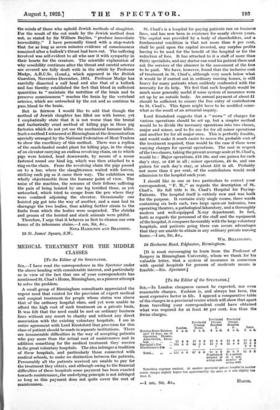MEDICAL TREATMENT FOR TILE MIDDLE CLASSES [To the Editor of
the SPECTATOR.
Sfe,—I have read the correspondence in the Spectator under the above heading with considerable interest, and particularly so in view of the fact that one of your correspondents has mentioned St. Chad's Home, Birmingham, as a pioneer attempt to solve the problem.
A small group of Birmingham consultants appreciated the urgent need that existed for the provision of expert medical and surgical treatment for people whose status was above that of the ordinary hospital class, and yet were unable to afford the high cost of such treatment on a private basis. It was felt that the need could be met on ordinary business lines without any resort to charity and without any direct association with the existing voluntary hospitals. I am in entire agreement with Lord Knutsford that provision for this class of patient should be made in separate institutions. There are innumerable difficulties in the way of accepting patients who pay more than the actual cost of maintenance and in addition something for the medical treatment they receive in the great voluntary hospitals. The idea infringes a tradition of these hospitals, and particularly those connected with medical schools, to make no distinction between the patients. Presumably all the patients received are unable to pay for the treatment they obtain, and although owing to the financial difficulties of these hospitals some payment has been exacted towards maintenance,the underlying principle is not infringed so long as this payment does not quite cover the cost of maintenance.
St. Chad's is a hospital for paying patients run on business lines, and has now been in existence for nearly eleven years. The capital was provided by a body of shareholders, and a fundamental condition is that not more than 6 per cent. shall be paid upon the capital invested, any surplus profits having to be used for the benefit of the hospital or for the reduction of fees. It has attached to it a staff of more than thirty specialists, and any doctor can send his patient there and ask the services of the almoner in the assessment of the fees to be paid. We have, however, found that the inclusive cost of treatment in St. Chad's, although very much below what it would be if carried out in ordinary nursing homes, is still heavy for many patients when suddenly confronted with the necessity for its help. We feel that such hospitals would be much more generally useful if some system of insurance were set up by an outside body. An annual payment of about 21 should be sufficient to ensure the free entry of contributors to St. Chad's. This figure might have to be modified some- what as the result of an actuarial inquiry.
Lord Knutsford suggests that a " menu " of charges for various operations should be set up, but a simpler method would be to divide the necessary operations into two classes, major and minor, and to fix one fee for all minor operations and another fee for all major ones. This is perfectly feasible, and would make it much easier to assess the probable cost of the treatment required, than would be the case if there were varying charges for special operations. The cost in respect of the two classes, taking the present average scale at St. Chad's, would be : Major operations, 216 16s. and one guinea for each day's stay, or 240 in all ; minor operations, 26 6s. and one guinea for each day's stay, or about 112 in all. Probably not more than 2 per cent, of the contributors would need admission to the hospital each year.
I should like in one or two particulars to correct your correspondent, "F. M.," as regards the description of St. Chad's. Its full title is St. Chad's Hospital for Paying- Patients. The hospital itself is entirely new and was built for the purpose. It contains sixty single rooms, three wards containing six beds each, two large open-air balconies, two operating theatres, a pathological laboratory, and a thoroughly modem and well-equipped X-ray department. In fact, both as regards the personnel of the staff and the equipment of the hospital, it compares favourably with the large voluntary hospitals, and patients going there can secure advantages that they are unable to obtain in any ordinary private nursing home.—I am, Sir, &e., Wm. BiLtatcrox. 58 Harborne Road, Edgbaston, Birmingham.
[It is most encouraging to learn from the Professor of Surgery in Birmingham University, whom we thank for his valuable letter, that a system of insurance in connexion with special hospitals for persons of moderate means is feasible.—En. Spectator.]






































 Previous page
Previous page